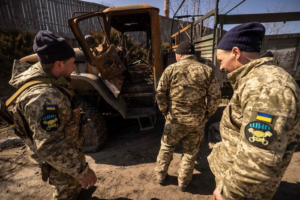

TOKYO—After a year-long delay to the Tokyo Olympics and during a global pandemic, the women of Team USA rose to the occasion.
The U.S. finished the Games with 66 medals in women’s events, the most ever for any nation. Women’s medals made up 58.4% of Team USA’s total of 113 overall, which topped the medal count at the Olympics.
“What an awesome testament to the hard work of these incredible athletes and to those strong women who paved the way before them,” said
Sarah Hirshland,
chief executive of the U.S. Olympic & Paralympic Committee. “We are so proud.”
The U.S. women won 23 gold medals to fuel the U.S. gold total of 39—one more than China and the most overall in Tokyo. Much of the world uses the gold-medal ranking as the ultimate measure of Olympic success.

The U.S. women’s basketball team won its seventh consecutive Olympic gold medal on Sunday.
Photo:
aris messinis/Agence France-Presse/Getty Images
The news on the U.S. men’s side wasn’t nearly as good. Actually, it was abysmal by U.S. Olympic standards.
The 41 medals in men’s events was the fewest for Team USA in modern Olympics history, which began in 1896—even though it led all men in the world. The biggest medal drops came in track and field, where the U.S. won six fewer men’s-event medals than at the 2016 Rio Games, and swimming, where the U.S. men won five fewer medals than last time despite Caeleb Dressel alone winning five golds.
The U.S. women have been gaining in their medal count in recent Games. They and the U.S. men each won 54 medals in Beijing 2008. The women won 58 in London 2012 compared with 45 for the U.S. men, and 61 women’s medals to 55 men’s in Rio 2016.
The reasons for the U.S. women’s improvement is two-pronged. The federal Title IX law that bars gender discrimination in schools and colleges has driven explosive growth of girls and women’s sports over the past four-plus decades.
And the International Olympic Committee has continued to add women’s events to the Games—the event schedule is now close to 50-50—which creates more opportunities for standout American women to win medals.

The U.S. women celebrated winning gold in volleyball over Brazil on Sunday.
Photo:
Frank Hoermann / Sven Simon/Zuma Press
Wrestling is a good example. The sport didn’t exist for women in the Olympics until 2004, and the number of women’s wrestling events has since expanded to its current six.
U.S. women’s wrestlers doubled their previous best result in a Games, winning four medals in Tokyo. That increase helped U.S. wrestlers overall achieve their best result in a non-boycotted Olympics, with nine overall. (In St. Louis 1904, the U.S. won 21 wrestling medals but was the only nation in the competition.)
Across the U.S., wrestling is seeing a growing pipeline of girls coming into the sport as more states add separate championship competitions for girls so they don’t have to wrestle boys.
In swimming, Team USA’s overall medal count dropped by three from 2016 to 30 but the women’s total increased. U.S. women’s swimmers won 18 medals in Tokyo and men won 12—although eight of them were gold.
In 2016, bolstered by two all-time greats, the U.S. men won 17 swimming medals to fuel the U.S. overall swimming total of 33. Michael Phelps won six medals in those Games, including five golds, and Ryan Lochte helped the U.S. win gold in the 4×200 relay.
Neither swimmer was on the 2021 U.S. Olympic team—Phelps because he retired and Lochte because he didn’t qualify. Together in their long careers, they combined to win the U.S. 40 Olympic medals.

Tamyra Mensah-Stock won gold, helping U.S. women wrestlers take home four medals.
Photo:
Kyodonews/Zuma Press
On the track, the U.S. men failed to win an individual gold medal in a running event, despite winning four such medals two years ago at the world championships. It took until the last night at Olympic Stadium for the U.S. men’s runners to win a gold—running away with the 4×400 relay, a race they have long dominated.
On the men’s marathon course in Japan, Galen Rupp finished eighth, behind his bronze-medal finish in Rio. Meanwhile, Molly Seidel won bronze in the women’s marathon—the first U.S. woman to medal in the event since Deena Kastor in 2004.
Overall, the U.S. track and field team won 26 medals in Tokyo, 10 in men’s events and 15 in women’s events. The U.S. also won bronze in the 4×400 mixed relay, which includes two men and two women.
Of all the Team USA results from Tokyo, however, one was the most important: Out of 627 U.S. athletes including alternates, just three tested positive for Covid-19.
All three—beach volleyball player Taylor Crabb, gymnast Kara Eaker and pole vaulter Sam Kendricks—were isolated before they moved into the Olympic Village, according to the USOPC. Crabb and Eaker were home by Sunday and Kendricks was en route, the USOPC said.
Hirshland said the USOPC prepared for all scenarios, including the worst case, in which organizers had to halt the Games because of an outbreak. She praised staff and athletes for following Covid protocols.
“People did what they needed to do to make this happen,” she said.
Write to Rachel Bachman at rachel.bachman@wsj.com
Copyright ©2021 Dow Jones & Company, Inc. All Rights Reserved. 87990cbe856818d5eddac44c7b1cdeb8
















